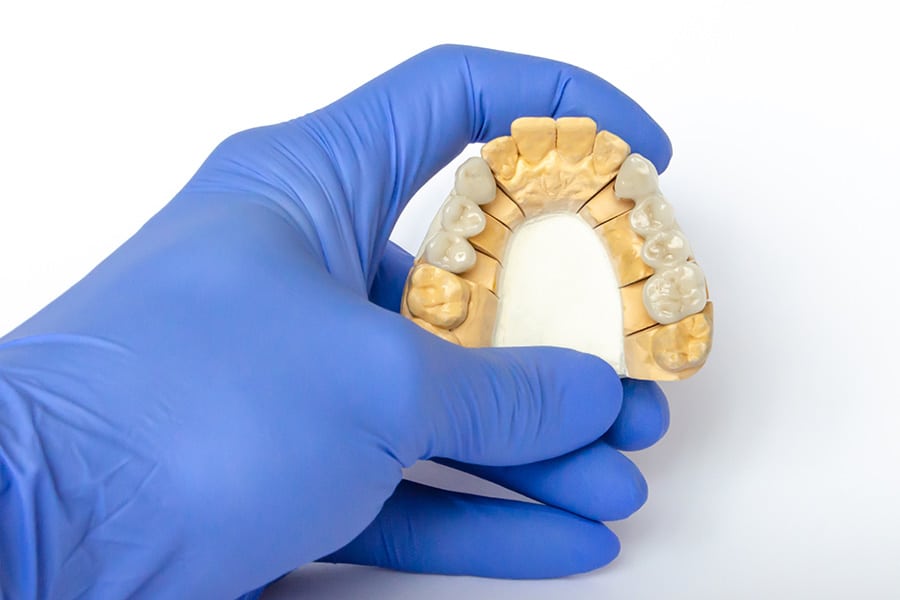Thinking that dental bridges may be the answer to fix your missing teeth? Dental bridges offer both a practical and a cosmetic fix to address missing teeth. Here’s everything you need to know about what are dental bridges and how they can help correct your smile.
What is a Dental Bridge?
A dental bridge is a method of securing a fake tooth in place by anchoring it to the neighboring teeth. They improve your dental function and the appearance of your teeth. They are constructed from artificial teeth and an anchoring material to keep your tooth in place.
Bridges can replace one or multiple missing teeth. They can also be customized to fit the shape and appearance of your teeth, giving you a healthy and natural-looking smile.
What Are the Benefits of Dental Bridges?
Dental bridges have both functional and cosmetic benefits. They replace missing teeth to restore your smile and your ability to chew normally. The procedure also bridges the gap between missing teeth to improve your ability to speak properly.
Dental Bridge Types
There are four main types of dental bridges. Your dentist can recommend which type of bridge is most effective for your oral health.
Traditional Dental Bridge
The most common type of bridge is a Traditional Dental Bridge. This type of bridge is secured using crowns that are cemented to both surrounding teeth. Traditional bridges are most often used when there are natural and healthy teeth on either side of the artificial tooth.
Cantilever Dental Bridge
Cantilever Dental Bridges are similar to traditional bridges. They use a dental crown to secure the false tooth in place. However, cantilever bridges only cement the crown to one natural tooth.
Cantilever bridges are a common option for when you only have one natural tooth next to the false tooth. This option is less secure than other types of bridges.
Maryland Dental Bridge
Instead of using crowns to secure the fake tooth in place, Maryland Dental Bridges use a bonding material, usually metal or porcelain, to hold the tooth in place. This material is secured to the backs of the two surrounding natural teeth. Maryland bridges are typically used to secure front teeth in place.
Implant-Supported Dental Bridge
An Implant-Supported Dental Bridge uses dental implants to secure the false teeth in place. This is a far more involved procedure but is considered the most secure option. Implants usually involve securing the false tooth to the jawbone.
Implant-supported bridges are typically used when there are three or more missing teeth in a row. However, they are also used in other circumstances where more stability is needed.
What is the Process for Getting a Dental Bridge?
The process of getting a bridge begins by using a local anesthetic to numb the area. Once this is done, your dentist will reshape the natural teeth around your abutment, or natural, tooth. To do so, some of the enamel is removed to support the bridge.
Next, your dentist will take impressions to create your artificial tooth. This tooth will be specially made to fit the shape and color of your natural teeth. Finally, the bridge will be added. Usually, a temporary bridge is used first and a permanent bridge is cemented in place at a later visit.
The process of getting a bridge will be slightly different for each type of bridge. Ask your dentist for more information on the type of bridge you will be getting.
Risks of Dental Bridges
Dental bridges are a safe procedure, but there can be some drawbacks. If the neighboring teeth are not strong enough to support the bridge, it could cause your natural teeth to fracture.
There is also some risk if you do not appropriately care for the area. If not properly cleaned, the bridge can trap plaque and bacteria. This can eventually lead to cavities or gum inflammation. Good oral hygiene is essential to ensure that no problems occur after your procedure.
How Much Do Dental Bridges Cost?
The price of a bridge will depend on several factors. Namely, how many false teeth you need and what type of bridge you are using. The material involved will also alter the price significantly.
On average, traditional and cantilever bridges will range around $2,000 to $5,000. Maryland bridges are usually slightly less expensive, averaging between $1,500 and $2,500.
The most expensive procedure is implant-supported bridges. These will go for anywhere from $5,000 to $15,000. Consult your dentist for an exact estimate for your procedure.
Do You Need Dental Bridges?
Think that you may need dental bridges? East Valley Dental Professionals are here to answer your questions about bridge procedures. Call us at 480-838-3033 to schedule your appointment.

